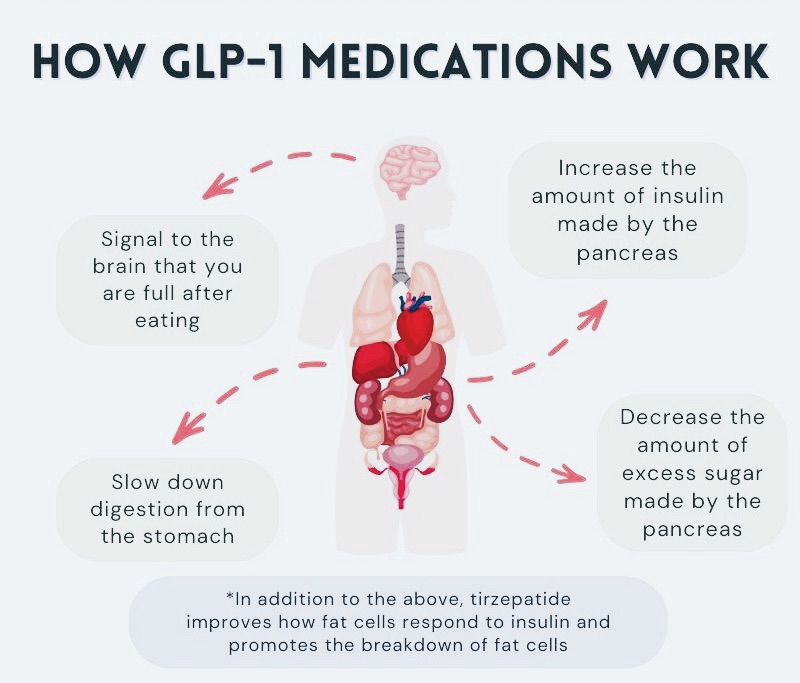Introduction: The Growing Role of GLP-1 Medications in Weight Management
Did you know that nearly 42% of American adults struggle with obesity? For many, traditional diet and exercise alone aren’t enough to achieve significant, lasting weight loss. This is where GLP-1 medications are revolutionizing medical weight loss.
Originally developed for type 2 diabetes, medications like Semaglutide (Wegovy, Ozempic) and Tirzepatide (Zepbound, Mounjaro) have shown remarkable effectiveness for weight management. But how do they work? Who qualifies? And what should you know before considering them?
This comprehensive guide covers everything from mechanisms of action to real-world results, helping you make informed decisions about GLP-1 medications for weight loss.
What Are GLP-1 Medications?
GLP-1 (Glucagon-Like Peptide-1) receptor agonists are a class of medications that mimic the effects of the natural GLP-1 hormone in your body. They work through several mechanisms to support weight loss:
How GLP-1 Medications Work for Weight Loss
- Appetite suppression: Slows gastric emptying and acts on brain receptors to reduce hunger
- Blood sugar control: Enhances insulin secretion when blood sugar is high
- Reduced food cravings: Particularly effective against high-fat, high-sugar foods
- Metabolic benefits: May improve cholesterol and blood pressure

FDA-Approved GLP-1 Medications for Weight Loss
Medication Brand Name Approved For Average Weight Loss Semaglutide Wegovy Weight Loss 15-20% of body weight Tirzepatide Zepbound Weight Loss 20-25% of body weight Liraglutide Saxenda Weight Loss 5-10% of body weight
Who Qualifies for GLP-1 Medications?
Not everyone is eligible for prescription GLP-1 medications. The FDA has specific criteria based on clinical trials and safety data:
Standard Eligibility Criteria
- Adults with BMI ≥30 (obesity)
- Adults with BMI ≥27 plus at least one weight-related condition (hypertension, type 2 diabetes, high cholesterol)
- Failure to achieve significant weight loss through lifestyle changes alone
Special Considerations
Some providers may consider GLP-1 medications for:
- Patients preparing for bariatric surgery
- Those with obesity-related joint problems
- Individuals with genetic predispositions to obesity
The Science Behind GLP-1 Medications and Weight Loss
Clinical studies demonstrate impressive results for GLP-1 medications in weight management:
Key Clinical Trial Results
- STEP Trials (Semaglutide): 68% of participants lost ≥10% body weight vs. 21% with placebo
- SURMOUNT Trials (Tirzepatide): Up to 22.5% weight loss at highest dose
- SUSTAIN Trials: Significant improvements in cardiovascular risk factors

How GLP-1 Compares to Other Weight Loss Methods
Method Average Weight Loss Sustainability Side Effects Diet/Exercise Alone 3-7% Often regains Minimal GLP-1 Medications 15-25% Maintained with treatment GI issues common Bariatric Surgery 25-35% Long-term Surgical risks
What to Expect: The GLP-1 Weight Loss Journey
Starting GLP-1 medications involves several stages for optimal results and safety:
Typical Treatment Timeline
- Week 1-4: Low starting dose to minimize side effects (0.25mg Semaglutide)
- Month 2-3: Dose escalation every 4 weeks
- Month 4-6: Therapeutic dose reached (2.4mg Wegovy)
- Month 6+: Maintenance phase with ongoing monitoring
Realistic Weight Loss Expectations
- First month: 2-5% body weight (mostly water)
- Months 2-4: 1-2 lbs/week average
- Month 6+: Plateau often occurs
Potential Side Effects and How to Manage Them
Like all medications, GLP-1 agonists can cause side effects, primarily gastrointestinal:
Common Side Effects
- Nausea (40-50% of users) – Usually mild, improves over time
- Diarrhea or constipation – Hydration and fiber help
- Headaches – Typically temporary
- Fatigue – Often resolves after dose adjustment
Serious (But Rare) Risks
- Pancreatitis (stop medication immediately if severe abdominal pain occurs)
- Gallbladder issues
- Potential thyroid tumor risk (contraindicated in those with personal/family history of medullary thyroid cancer)

Maximizing Results: Lifestyle Factors That Enhance GLP-1 Effects
GLP-1 medications work best when combined with healthy lifestyle changes:
Nutrition Tips for GLP-1 Users
- Prioritize protein: Helps preserve muscle mass during weight loss
- Stay hydrated: Combat constipation and support metabolism
- Small, frequent meals: Easier to tolerate than large portions
- Limit high-fat foods: Can exacerbate nausea
Exercise Recommendations
- Resistance training: 2-3x weekly to maintain muscle
- Cardio: 150+ minutes weekly of moderate activity
- NEAT: Increase non-exercise activity (walking, standing)
Long-Term Considerations: Maintenance and Sustainability
A key question about GLP-1 medications is whether weight loss can be maintained after stopping:
Current Research on Weight Maintenance
- STEP 4 Trial: Participants regained 2/3 of lost weight after stopping Semaglutide
- Ongoing studies: Investigating lower maintenance doses
- Clinical practice: Many providers recommend long-term use for obesity (similar to hypertension medications)
Cost and Insurance Coverage
- Without insurance: $900-$1,300/month
- Coverage varies: Many plans require prior authorization
- Savings programs: Manufacturer coupons may reduce cost
Frequently Asked Questions About GLP-1 Medications
1. How quickly does weight loss occur with GLP-1 medications?
Most people see noticeable changes within 4-8 weeks, with maximal effects around 6-12 months.
2. Can you drink alcohol while taking GLP-1 medications?
Alcohol may worsen side effects like nausea. It’s generally recommended to limit consumption.
3. Do GLP-1 medications cause muscle loss?
Some muscle loss occurs with any significant weight reduction. Resistance training and adequate protein help minimize this.
4. What happens if you miss a dose?
Take it as soon as possible unless it’s close to your next scheduled dose. Never double doses.
5. Are there alternatives if GLP-1 medications don’t work?
Other options include other prescription weight loss medications, bariatric surgery, or intensive behavioral programs.
Conclusion: Are GLP-1 Medications Right for You?
GLP-1 receptor agonists represent a breakthrough in medical weight management, offering substantial, sustainable weight loss for many individuals struggling with obesity. While not a magic solution, these medications—when combined with lifestyle modifications—can help achieve results that were previously only possible through bariatric surgery.
If you’re considering GLP-1 medications:
- Consult an obesity medicine specialist or endocrinologist
- Review your complete medical history for contraindications
- Understand the commitment to long-term treatment
- Set realistic expectations about results and side effects
Have you or someone you know tried GLP-1 medications for weight loss? Share your experiences in the comments below!
